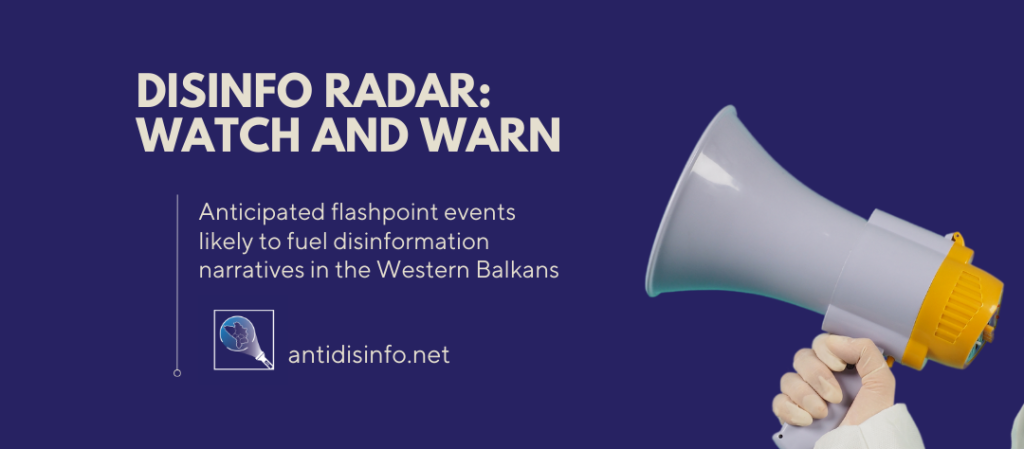Listen to the article
Anticipated Flashpoint Events Could Fuel Disinformation in Western Balkans During November 2025
Disinformation continues to pose a persistent challenge across the Western Balkans, with harmful campaigns increasingly targeting key political and social events to deepen societal divisions, undermine democratic institutions, and erode public support for Euro-Atlantic integration.
A recent monitoring initiative led by the Metamorphosis Foundation has identified several potential flashpoint events in November 2025 that could become targets for coordinated disinformation campaigns across the region. The initiative, conducted under the “WATCH AND WARN” program, aims to provide early warning of potential disinformation threats before they can take root.
“What we’re seeing is an increasingly sophisticated approach to disinformation that exploits regional tensions and key moments of political transition,” explained a senior researcher with the Metamorphosis Foundation. “By identifying these vulnerable periods in advance, we can better prepare media outlets, civil society organizations, and government agencies to respond effectively.”
Among the potential flashpoints identified for November are several electoral processes, anniversary commemorations, and international diplomatic meetings that historically have attracted significant disinformation activity in the region.
Particularly concerning are upcoming local elections in two Western Balkan countries, which analysts believe may become targets for external influence operations. Previous electoral cycles have seen coordinated attempts to undermine faith in democratic processes through false claims of fraud, foreign interference, and corruption.
The research also highlights several historical anniversaries in November that have previously been exploited to inflame ethnic tensions. These commemorative events often become vehicles for revisionist narratives that distort historical facts to serve contemporary political agendas.
“Anniversary events provide fertile ground for disinformation actors,” noted a regional media analyst familiar with the report. “They tap into existing historical grievances and often promote narratives that portray certain ethnic groups as perpetual victims or aggressors, reinforcing divisions rather than promoting reconciliation.”
International relations also feature prominently in the anticipated disinformation landscape. Several high-level meetings between Western Balkan leaders and European Union officials scheduled for November could trigger anti-EU disinformation narratives. These typically portray the EU integration process as a threat to national sovereignty or cultural identity.
The monitoring initiative has observed that such narratives often originate from both domestic and foreign sources, with content frequently cross-pollinating between traditional media outlets, social media platforms, and messaging applications.
Security experts note that disinformation campaigns in the Western Balkans have become increasingly sophisticated in recent years, often blending factual information with distorted interpretations to create convincing false narratives. These campaigns frequently exploit existing social tensions, economic anxieties, and political polarization.
“What makes these operations particularly effective is their ability to tap into genuine concerns,” said a cybersecurity expert specializing in information warfare. “The most damaging disinformation doesn’t create divisions from scratch – it identifies existing fault lines in society and systematically works to widen them.”
The WATCH AND WARN initiative represents a proactive approach to countering these threats by providing advance warning of potential disinformation narratives before they gain significant traction. The program involves collaboration between fact-checking organizations, media outlets, and civil society groups across the Western Balkans.
Experts emphasize that countering disinformation requires a multi-faceted approach involving media literacy education, support for independent journalism, and stronger platform governance. Regional cooperation is also critical, as disinformation narratives frequently cross national borders and target multiple countries simultaneously.
As November approaches, media organizations and fact-checkers across the region will be monitoring these identified flashpoints closely, prepared to debunk false narratives before they can gain momentum.
The Metamorphosis Foundation has committed to publishing regular updates on emerging disinformation trends and providing resources to help journalists and citizens identify and respond to false information campaigns throughout the month.
Verify This Yourself
Use these professional tools to fact-check and investigate claims independently
Reverse Image Search
Check if this image has been used elsewhere or in different contexts
Ask Our AI About This Claim
Get instant answers with web-powered AI analysis
Related Fact-Checks
See what other fact-checkers have said about similar claims
Want More Verification Tools?
Access our full suite of professional disinformation monitoring and investigation tools




8 Comments
Eroding public trust in democratic institutions is a common goal of disinformation campaigns. Strengthening media literacy and resilience of civil society will be vital to maintaining social cohesion and Euro-Atlantic integration in the Western Balkans.
Disinformation is a constant challenge, but being proactive in monitoring and preparedness is an important step. I’m curious to learn more about the specific tactics and actors behind the anticipated campaigns in the Western Balkans.
Yes, understanding the motivations, methods, and sources of disinformation will be key to developing tailored countermeasures. Transparency and public awareness will also be critical.
Coordinated disinformation campaigns that exploit regional tensions and political transitions are particularly concerning. Strengthening media literacy and resilience of democratic institutions will be key to countering these threats.
Agreed. Early warning systems and collaborative efforts between media, civil society, and government are crucial to get ahead of disinformation before it can take root and spread.
Anticipating potential disinformation flashpoints is a smart move, but the real challenge will be coordinating an effective, multi-stakeholder response. I hope the efforts highlighted in this article can serve as a model for other regions facing similar threats.
The Western Balkans have long been vulnerable to foreign interference and disinformation. Identifying potential flashpoints in advance is a smart move, but effective implementation and follow-through will be the real test.
Disinformation is a serious threat to democracy, especially in regions like the Western Balkans with fragile political and social structures. It’s good to see efforts to proactively identify potential flashpoints and prepare for effective response.